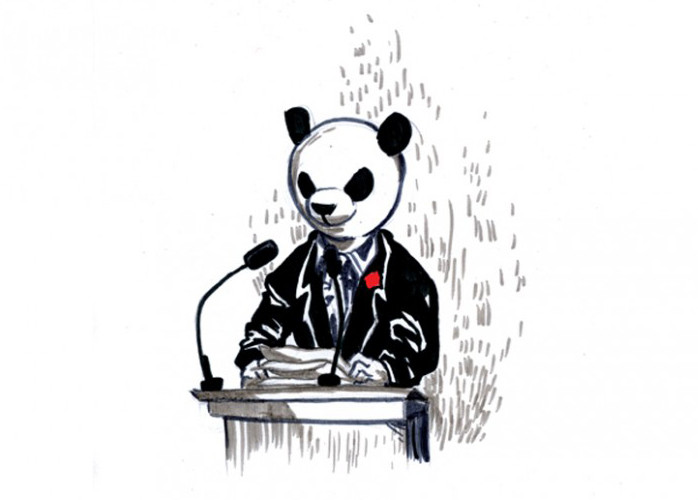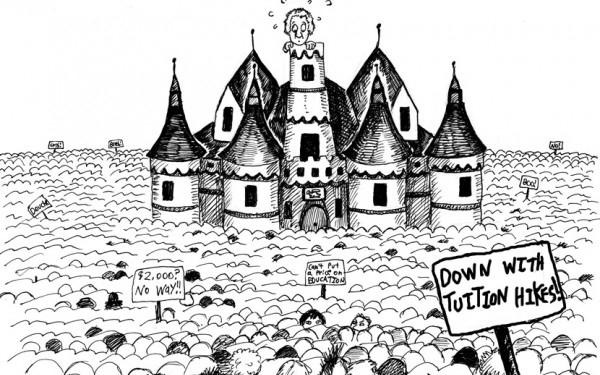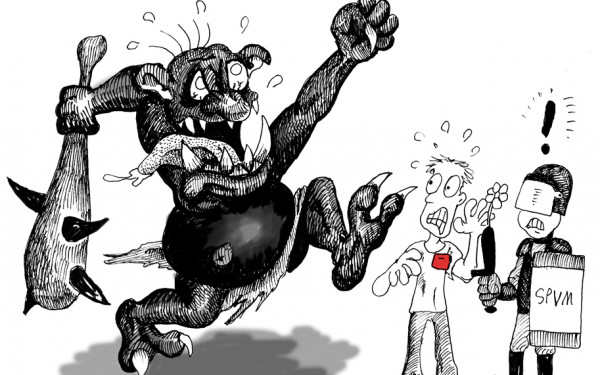Editorial: Make P-6 an Election Issue
When Katie Nelson, an incoming philosophy student at Concordia, started getting tickets for various offences related to participating in a protest, she hung them up on her fridge as a kind of joke. But when she ran out of space there, and when the total amount that she had been ticketed surpassed $6,500, the joke petered out.
Nelson is currently embroiled in a lawsuit against the city of Montreal and the specific police officer responsible for ticketing her so many times. Her case serves as a reminder that while the student strike may have ended a year ago, many are still experiencing the fallout.
While there may not be nightly demonstrations that end in mass arrests, and the clamour of pots and pans hasn’t been heard in the streets for months, it is essential we remember that the expanded municipal bylaw P-6 is still very much in effect.
The new P-6 was a by-product of the student strikes that Nelson and thousands of others were involved in last year.
The bylaw, which was adopted by Union Montreal—the now dissolved party of former mayor Gérald Tremblay—prohibits the use of masks during a demonstration and allows police to declare a protest illegal if a route is not submitted beforehand.
A major facet of Nelson’s case is the argument that she is the victim of political profiling. While police commander Ian Lafrenière has said that the Service de Police de la Ville de Montréal does not engage in such activities, it is hard to overlook the fact that, with crowds numbering in the thousands, Nelson was consistently ticketed for things like jaywalking or cursing in public (none of her alleged offences were for anything violent) while others milled about around her, committing the same offences.
Perhaps more shocking is the fact that Nelson claims multiple officers have admitted to her that she is being profiled due to her political views.
Political profiling was not the only controversial subject during the student strike, and it isn’t the only issue being brought up by Nelson’s case. P-6 is also being called into question by Nelson’s lawyer, and combined with the looming November municipal election, there is no better time than now to reopen the debate on the bylaw.
While many individual candidates have issued statements on P-6, none of the parties in the running have made the bylaw a part of their platform, be it to abolish or maintain it.
Mayoral candidate Richard Bergeron has denounced the bylaw in the past, telling TVA Nouvelles it “plays with the democratic rights of Montrealers.” Bergeron is heading Projet Montréal, the party that has, in the past, tried to see P-6 abolished.
In contrast, Denis Coderre, mayoral candidate of Team Denis Coderre, has previously supported the existence of P-6. His party includes former members of Union Montreal, the ones responsible for expanding the bylaw in the first place.
What is needed now is for parties to take a stance on P-6. It goes without saying that the bylaw will not go anywhere if no one does anything about it. If, as the Aug. 16 Montreal mayoral debate has indicated, mayoral candidates are looking to corner the youth vote, why not address an issue that affects not only students, but so many young people?
Some individual candidates have not been shy about voicing their opinions on the bylaw, but that only goes so far. A united party standing against this bylaw, which severely restricts the right to protest, would not only show those affected by P-6 that they have not been forgotten, but would also remind the public that this unconstitutional bylaw still exists.
Simply because it is not being read over a microphone by SPVM officers every night does not mean it has disappeared.
Coming out against of P-6 is an admittedly dangerous move for a politician. But when a bylaw restricts Charter rights, it is worth the risk.
Dozens of organizations, among them the Quebec Bar Association and numerous student associations, have expressed their concerns with the bylaw; it is clear that many are against its existence. Bill 78, an emergency law that also severely limited the right to protest and the provincial equivalent to P-6, was swiftly cancelled upon the Parti Québécois’ rise to power. There is no reason why the same cannot happen for P-6.
It was under P-6 that hundreds of peaceful protestors were rounded up and arrested after marching less than a city block during the anti-police brutality demonstration this past March; it was under P-6 that demonstrators, among them minors, journalists and passersby, were held for hours in the snow during the March 22 rally; and it is under P-6 that rights will continue be infringed upon.
To be a part of Montreal municipal politics means to be faced with difficult issues, be they corruption, deficits or potholes.
It’s time that those in the running take a stance on P-6.


_600_832_s.png)



2_600_375_90_s_c1.jpg)